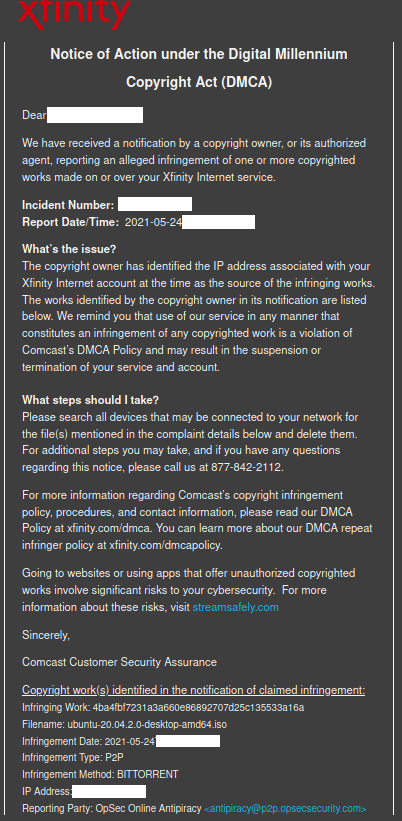
Update: The article was updated with OpSec Security’s official statement.
If you do not use torrent files to download a copyrighted material, you may have never received a DMCA notice.
However, what if you receive a copyright infringement notice from your Internet Service Provider for downloading free software?
Xfinity, an internet service company by Comast has managed to do just that. A subscriber received a DMCA notice for downloading Ubuntu 20.04.2 LTS ISO file.
Wait, what? Yes, you heard it right. Let us look at what it is all about.
DMCA Notice from ISP for Downloading Ubuntu
A recent Reddit thread by the user u/NateNate60 claims that a copyright notice was served for downloading Ubuntu.
But is it illegal to download Ubuntu or distribute Ubuntu through torrent?
Absolutely not.
Canonical has officially listed the torrent file that you can download to use BitTorrent and make use of peer-to-peer connections if the direct download is slow.
And some download it just to seed it for other users.
But, Xfinity sending a DMCA notice, makes it confusing. The notice mentions that the one responsible for notifying the copyright infringement is OpSec Online Antipiracy.
The notice writes:
“We have received a notification by a copyright owner, or its authorized agent, reporting an alleged infringement of one or more copyrighted works made on or over your Xfinity Internet Service.”
Technically, Canonical is not the only copyright holder, but the copyright holders should not be able to restrict distribution of an open-source software as mentioned by a Gentoo maintainer (ryao) in the Reddit thread.
So, what part of the ISO do the copyright holder claim to own here? Or is it just a big innocent mistake by an automated system?
Here’s how the notice looks like:

Normally, you can ignore it for the first time but receiving a DMCA notice when you have done nothing is indeed stressful and unfair.
You may want to sue them back for sending a DMCA notice wrongfully, but not everyone will be willing to invest their precious time and money to get back to these DMCA notices issues as an error.
What’s Next?
Many have suggested contacting Ubuntu’s legal team and not let this slide away, but the subscriber does not want to risk making things worse.
Of course, one would not want the Internet service to be disconnected for a DMCA notice abuse.
OpSec Security, the company behind the DMCA notice issued a public statement that their DMCA notice program was spoofed an unknown third-party to damage their reputation:
Yet to receive a response about the incident from Ubuntu (Canonical). Let’s see what they have to say about it.
What do you think about the DMCA notice? Do you think that it is just an innocent automated error?
- Even the biggest players in the Linux world don't care about desktop Linux users. We do.
- We don't put informational content behind paywall. Your support keeps it open for everyone. Think of it like 'pay it forward'.
- Don't like ads? With the Plus membership, you get an ad-free reading experience.
- When millions of AI-generated content is being published daily, you read and learn from real human Linux users.
- It costs just $2 a month, less than the cost of your favorite burger.
Become a Plus Member today and join over 300 people in supporting our work.









